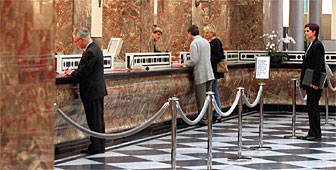Banks lash out at British interference

Switzerland's top bankers have accused the British authorities - and their ambassador to Bern - of attempting to undermine the country's banking system.
The British ambassador, Basil Eastwood, denied the accusations, saying he had been “misrepresented”.
Swiss banking secrecy rules have come under sustained attack from the European Union in recent weeks and on Wednesday the Swiss Bankers Association hit back.
Speaking in Zurich, the organisation’s president, Georg Krayer, singled out Britain as one of the worst offenders.
He also condemned the British ambassador to Switzerland, Basil Eastwood, for actively lobbying against Swiss interests.
Krayer added that Britain was hardly a shining example of transparency, pointing out that its trust structure made it extremely difficult to identify asset holders.
Ambassador Eastwood denied trying to undermine Switzerland’s position. He told swissinfo that he had been warning the Swiss authorities for some time that a storm was brewing over banking secrecy.
He also said he had not been lobbying any more than he would normally as a representative of the British government.
“I’m a little bit concerned that what I have been saying has been misrepresented,” he said. “If they [the SBA] wish to attack me personally I would be happy to discuss it,” he said.
The ambassador added that he would be meeting the SBA president on Friday and would take up the matter with him then.
Discord with the EU
The SBA gave notice of its refusal to cave in to outside pressure at its annual press conference – just three weeks before finance ministers are due to meet for talks on a European Union directive for an exchange of information on EU citizen’s savings.
Switzerland has come under fire for opposing plans by the EU to clamp down on tax evasion by persuading countries to hand over information about EU citizen’s savings.
Bern says this would compromise Swiss banking secrecy rules and threaten Switzerland’s position as a financial centre.
Matters came to a head in early September, when several EU finance ministers demanded that a list of sanctions be drawn up against Swiss financial institutions should Switzerland refuse to resolve the issue by the end of the year.
Urs Roth, director of the SBA, said Switzerland had already proposed an alternative of levying a withholding tax on savings income and sending the money to Brussels.
“The European Union has no reason to threaten Switzerland. We believe that we have made a very generous offer with the withholding proposition,” said Roth.
This would not contravene banking secrecy because no transfer of information about account holders would take place.
No U-turn
The SBA supports the Swiss government’s stance on maintaining its right to banking secrecy and emphasises that it enjoys great public support. Roth pointed out that the United States had also decided not to sign the directive.
In 2001, banking generated SFr45 billion ($30 billion), around 11 per cent of the total economic output in Switzerland – twice as high as in Germany or the United States.
Roth says that should Switzerland agree to the EU’s demands, other tax havens and banking centres would be quick to benefit.
“If the EU introduces the exchange of information systems within the 15 member states plus a limited number of third party countries such as Switzerland and America, there are plenty of well regulated financial marketplaces out there that would welcome customers and would not provide information,” Roth told swissinfo.
“I do not understand why the EU does not see that problem.”
swissinfo, Karin Kamp
In 2001, banking generated SFr45 billion ($30 billion)in Switzerland.
The European Union is demanding Swiss banks hand over information on EU citizens assets.
The SBA refuses to abandon banking secrecy.

In compliance with the JTI standards
More: SWI swissinfo.ch certified by the Journalism Trust Initiative











You can find an overview of ongoing debates with our journalists here . Please join us!
If you want to start a conversation about a topic raised in this article or want to report factual errors, email us at english@swissinfo.ch.